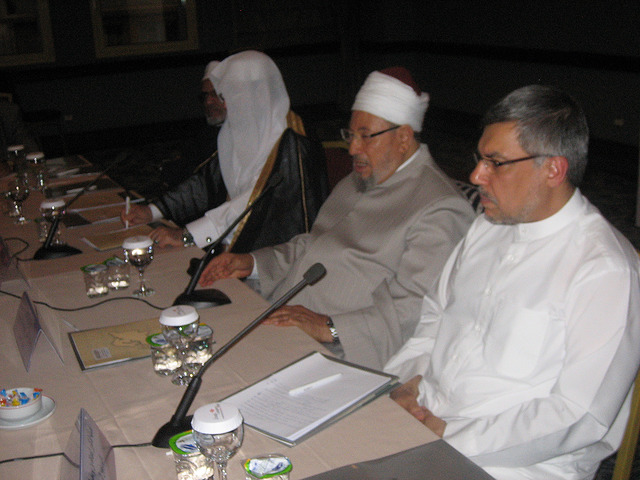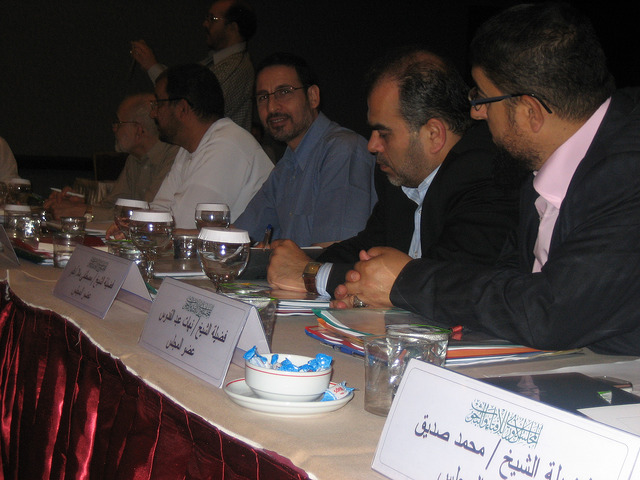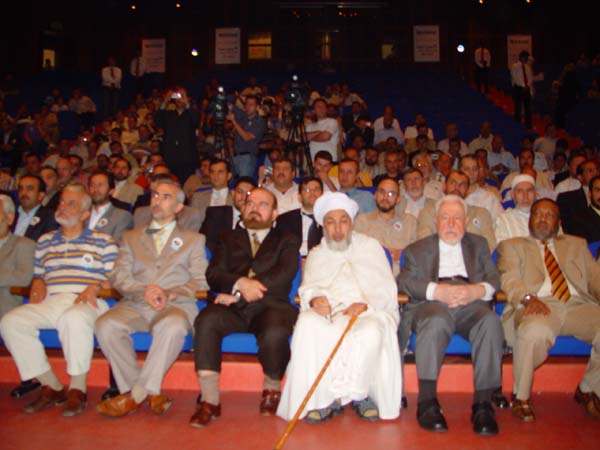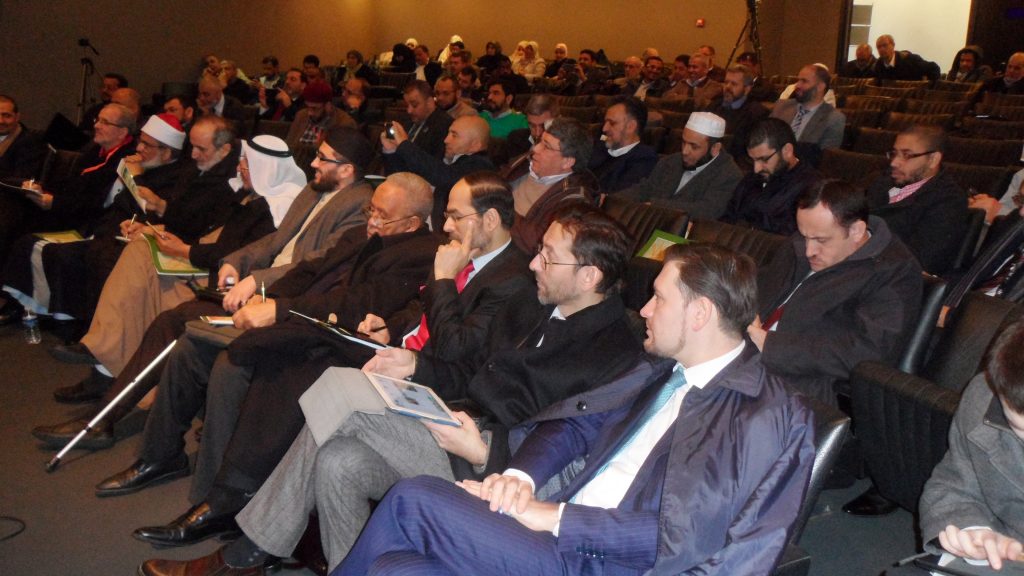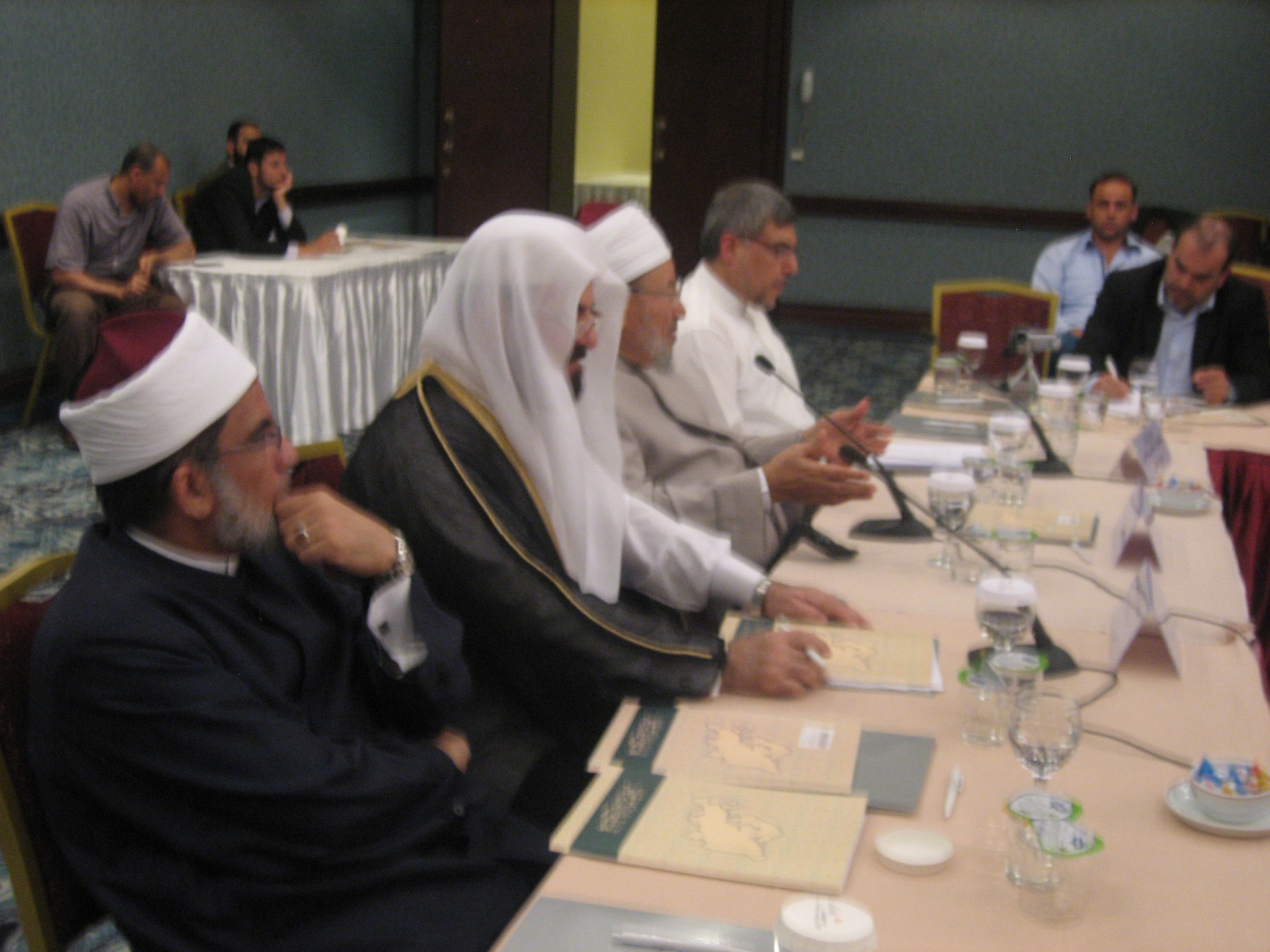The Ninth Ordinary Session of the European Council for Fatwa and Research
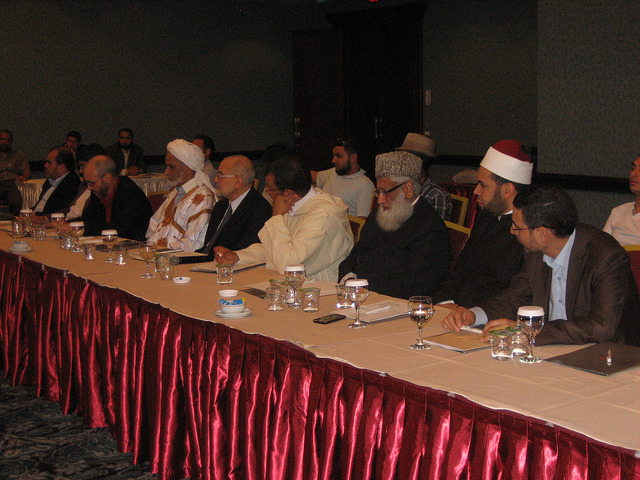
European Council for Fatwa and Research
In the Name of Allah, Most Gracious, Most Merciful
Final Statement
of the Ninth Ordinary Session of the European Council for Fatwa and Research that was held in the Headquarters of the Federation of Islamic Organizations in France, in the city of Paris from 3-7 of Jumada al-Ula/1423 AH corresponding to 13-17 of July/ 2002 AD.
Praise be to Allah, the Worlds’ Sustainer and peace be upon our Master Muhammad and on all his family and his Companions.
With the Blessings and Grace of Allah Almighty, the Ninth Ordinary session of the European Council for Fatwa and Research was held in the Headquarters of Federation of Islamic Organizations in France, in the city of Paris from 3-7 of Jumada al-Ula/ 1423 AH corresponding to 13-17 of July/ 2002 AD under the presidency of His Eminence Shaikh Yusuf al-Qaradawi, the President of the Council (may Allah protect him) and at the presence of most of the members.
At the opening session, in which the officials of the Federation of Islamic Organizations in France as well as representatives from Islamic Institutions, Sectors and Centers and a large multitude of Muslims participated, His Eminence Al-Haj al-Tuhami, the President of the Federation welcomed his brothers, the President and the members of the Council on the occasion of holding the Ninth Sessions of the Council in Paris. Mr Abdullah Mansur also delivered a speech on behalf of the President of the Federation of Islamic Organizations in Europe welcoming the Council. Then His Eminence Dr. Yusuf al-Qaradawi, the President of the Council (may Allah protect him) delivered a word of gratitude to the Federation of Islamic Organizations in France for hosting the Ninth Session of the Council, and to the French Government for the facilities it made available so that this session of the Council could be held on its land. His Excellency also called for promoting the values of dialogue.
The Council inspected its agenda and listened to the periodical report of the General Secretariat and made the required decisions for administrative activities, the most important of which was the approval of the amendments of the Constitution. It also listened to the report of the Research Committee and thanked those who had participated in producing the first issue of the scientific journal of the Council. It thanked in particular their Eminences the Vice President of the Council, the Secretary General, the Chairman of the Research Committee and the members of the Committee for their much appreciated efforts in producing this issue. It also thanked the dignified persons who sent their articles to the Journal. May Allah reward everybody with the best reward.
A number of decisions concerning the Journal were issued, the most important of which was that an editing committee was formed from the Chairman of the Research and Studies Committee as President, and the membership of the Committee’s members and an administrative Committee was formed for the Journal from the Vice President of the Journal as a Chairman and the membership of the Secretary General and the President of the Research and Studies Committee and Mr Abdullah Mansur. It was recommended that a consultative committee for the Journal be formed from researchers and scholars from among the members of the Council.
The Council also made a decision of including both His Eminence Dr. Husayn Hamid and Dr Salah Sultan as members therein.
Then the Council discussed a number of the issues appearing in its agenda and took the following decisions regarding them:
Resolution 9/1
Arbitration in Conflicts
The Council inspected the studies submitted to it by members of the Council regarding legal arbitration in the West, and after discussion and opinion exchanges it decided the following:
- The European Council for Fatwa and Research calls upon Muslims in Europe to refer to arbitration according to Islamic Law, particularly in their personal affairs and financial dealings, in order to hasten the settlement of their conflicts and avoid overburdening the official courts.
- Arbitration can be done through including a condition in the contract or through setting up an arbitration agreement when controversy rises. It is preferable that the original contract or the arbitration agreement be confirmed by an attorney or any other official authority.
- The parties can choose one arbitrator, male or female, or an arbitration committee consisting of several persons. Their number should be odd so that they may take their decision by the majority. It is necessary that among the arbitrators there are some who are acquainted with the rulings of Shari’a and current valid laws and they must all be well known for their honesty and righteousness.
- The arbitration decision shall be compulsory for all parties according to their pledge and they will have to execute it.
- The Council decided to prepare a detailed draft illustrating the measures of legal arbitration in accordance with European Laws and translate it into various languages to help Muslims follow this approach, and also prepare a form of the document of arbitration. All this is supposed to be achieved in the next course.
- The Council recommends that Colleges of Shari’a and Islamic Centers hold courses to qualify the arbitrators in cooperation with the departments of legal studies in European universities.
Resolution 9/2
Identifying the Crescent of the Month of Ramadan
After discussing the subject and exchanging views in this regard, the Council decided the following:
Confirming what was included in its resolution passed in the Third Ordinary Session concerning confirming the beginning of lunar months, particularly the month of Ramadan, namely, “The beginning of the Month of Ramadan and its end are marked through visually seeing (the crescent) whether with the naked eyes or through observatories, if this is confirmed in any Islamic country through a legally recognized method, in obedience of the honorable Prophetic order conveyed by the authentic honorable tradition: “If you see the crescent, start fasting, and if you see it (again) break your fast,” and the other tradition: “Fast upon seeing it and break your fast on seeing it.” This is valid only if the unquestionable scientific astronomical calculation does not deny the possibility of seeing it in any country. If this calculation confirms the impossibility of the legally recognized sighting in any country, it will render as invalid the witness of the witnesses that is not unarguable or that is the result of illusion, error or telling a lie, for the witness of the witnesses is only probable whereas the calculation is definite and what is probable cannot confront what is definite, let alone supercede it, according to the consensus of the scholars.”
Consequently, the Council sees that the principle, namely “adopting visual sighting with the condition that the definite calculation does not invalidate it” applies to confirming the beginning of all the lunar months including the month of Dhul Hijjah and what is related to it, such as fasting on the day of ‘Arafah and the ceremonies of al-Adha Festival.
Those who are present in Mecca to perform Hajj must—according to the consensus of scholars—abide by the legal confirmation that is issued by the relevant authorities in Saudi Arabia. But if the appearance of the crescent of Dhul Hijjah is proved through seeing only in Mecca al-Mukarrama and disagrees with the definite calculation, and those who are outside the vicinity of Hajj, such as the European countries, approve it, it will be unjustifiable to blame them because it is a controversial matter. It is agreed by jurists that there is no objection in controversial matters; conflicts and differences that lead to disruption and quarrels are disapproved by Shari’a in Allah’s Saying: “And hold fast, altogether, by the Rope which Allah (stretches out for you) and be not divided among yourselves,” and His Saying: “And do not fall into disputes lest you lose heart and your power depart.”
Resolution 9/3
The Ruling on Performing Prayers in a Church
The Council received a question from a group of Imams leading prayers in prisons concerning this matter. After detailed discussion the Council decided the following:
Confirming what was included in Resolution 23 [11/3] issued by the International Islamic Academy of Fiqh (Jurisprudence) answering question no.19, i.e. “Hiring churches for the purpose of performing prayers is legally permissible when necessary, as in the case described in the question. Praying in the direction of statues and pictures must be avoided and they must be covered with a partition if they are in the direction of qibla.” The Council sees that the necessity is certainly present in the case described in the question. As for covering the statues and pictures with a partition, it is something possible. Otherwise, the prayer is correct, the evidence being that the Prophet (peace be upon him) performed his prayers before hijra (his migration to Madina) in the direction of Ka’aba while it was surrounded by idols. Therefore, the Christian symbols in the church have no effect on the soundness of the prayer. The prayer is also sound if it is performed in the prison, for the Prophet (peace be upon him) said: “ (All) earth has been made for me a place for performing prayers and for purification (by tayammum).” It is also sound if performed in a common place devoted for worship for Muslims and non-Muslims. This ruling covers the five prayers, congregational prayers, Friday prayer and its sermon as well as lessons. Authorities ought to be asked to assign places for worship.
Resolution 9/4
The Ruling for Burying More Than One Dead Person in the Same Grave
The Council decided the following:
There is on legal objection to burying more than one person in the same grave in any manner, for the Prophet (peace be upon him) did that in the Battle of Uhud. However, the principle is that every person is supposed to be buried in a separate grave if there is no difficulty or inconvenience in doing so.
Resolution9/5
Postponed Topics
The Council touched upon a number of issues and after listening to the papers submitted by the members of the Council and discussing those papers it postponed issuing decisions concerning them in order to have further research and study. It also asked a group of the members to prepare further research on the following issues:
- the Bourse (foreign stock exchange)
- the Mawaqit (Assigned prayer times)
- milk banks for feeding children
- the project of the draft of arbitration
The Council also listed the following subjects on its agenda for the next session, In sha’a Allah.
- mercy killing (Euthanasia)
- cloning
- false representation of the (Islamic) nation
- fiqh (jurisprudence) of minorities and the fatwa controls concerning it
- jihad (struggle in the Cause of Allah)
- the concept of terrorism
- religious rhetoric and the necessity of changing it and what is meant thereby
- the need that is rendered as a necessity and the controls of applying it to the fiqh (jurisprudence) of minorities.
- the consequences of deeds and their effects on fiqh (jurisprudence) of minorities
Recommendations
1.The Council recommends that Muslims observe all rights and reflect a good image and a benevolent example. It also recommends that they be creative and inventive and encourage that on all levels.
- It recommends that all Muslims that live in Europe do their best to establish firms and financial institutions in various fields and communicate with companies of insurance and investment and the financial institutions prevalent in the West to agree with them on removing illegal practices, such as usury.
3.The Council recommends that Muslims in Europe work hard to secure the recognition of the state where they live of Islam and of Muslims as a religious minority like the other minorities in respect of enjoying their complete rights and organizing their personal affairs, such as marriage and divorce according to the tenets of their religion. Therefore, the Council recommends that Muslims form legal (Shari’a) Committees that will regulate their personal affairs according to the rulings of the Islamic noble Shari’a, and at the same time take into consideration abiding by prevalent laws.
- The Council also strongly recommends that these Muslim brothers commit themselves to what is stated in the Holy Qur’an and Sunnah and what Muslim Fuqaha’ (jurists) have unanimously agreed upon regarding the obligation of keeping the requirements of the pledge of security and the terms of citizenship and residence in the European countries where they live. Among the most important things they should observe and do:
- They are to believe that the souls, property and honor of non-Muslims are immune by virtue of the pledge according to which they have entered these lands. They are to abide by that in their conduct according to which they have been permitted to enter these countries and continue residing in them. Allah Almighty says: “And fulfill (every) engagement for (every) engagement will be enquired into (on the Day of Reckoning).”
- They are to respect the laws of the countries that accommodated them and protected them and enabled them to enjoy all the securities of noble living. Allah Almighty says; “ There is no reward for good other than good.”
- They are to avoid all means of illegal (haram) earning of all types, including the endeavor of some Muslims to get social security although they work or trade.
- They are to exert themselves to bring up the new generation—boys and girls—according to modern Islamic perspective, through establishing schools, and educational and recreational centers to protect them against deviation.
5.The Council also recommends that Muslims in general and those dwelling in the West in particular adhere to Allah’s religion and brotherhood, tolerance, moderation, cooperation in matters of benevolence and righteousness, and adopting quiet dialogue and sound methods to solve controversial problems away from the programs of strictness and paths of extremism that would distort the image of Islam and badly harm Muslims in general and Muslim minorities in particular. The enemies of Islam and those ignorant of it would defame it and warn others of it and its followers and instigate other nations against it. Allah Almighty says: “Invite (all) to the Way of your Lord with wisdom and beautiful preaching and argue with them in ways that are best and most gracious.”
- The Council confirms that Islam is the religion of peace for all humanity regardless of race, ethnic belonging and religions. Therefore, it rejects violence and terrorism in any form whatever and from any source whatever. It calls upon the world to observe the human values of civilization, justice, and equality among nations, besides the human rights
the international laws and conventions have always advocated and all heavenly religions enjoined.
The Conclusion of the Proceedings of the Course
Before concluding the proceedings of the Course the members along with the General Secretariat agreed to appoint the date for the next two Sessions as follows:
The Tenth Session in the Headquarters of the Council in Dublin—Ireland from 19 to 25 of Dhul Qa’ada / 1423 AH corresponding to 22—28 of January/ 2003 AD.
The Eleventh Session in Stockholm in Sweden from 3 to 9 of Jumada al-Ula / 1424 AH corresponding to 2—8 of July/ 2003 AD.
His Eminence the President of the Council concluded the proceedings of the Session by addressing his sincere thanks to the brothers working in the Federation of Islamic Organizations in France for their hosting the session and for their efforts of hospitality and nice reception and well measured organizational effort. The Council also thanked the French Government for granting the members of the Council the required visas facilitating its being held on its land satisfactorily. The Council also thanked “Al-Europiyya” Journal for covering the proceedings of the Session. The Council repeats its thanks and appreciation for al-Maktoum Charity Committee for supporting the Council and covering its expenses all the time.

